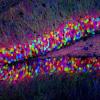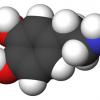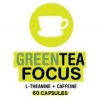L-Theanine
L-theanine (N-ethyl-L-glutamine) or theanine is a major amino acid uniquely found in green tea. L-theanine has been historically reported as a relaxing agent, prompting scientific research on its pharmacology. Animal neurochemistry studies suggest that L-theanine increases brain serotonin, dopamine, GABA levels and has micromolar affinities for AMPA, Kainate and NMDA receptors. In addition has been shown to exert neuroprotective effects in animal models possibly through its antagonistic effects on group 1 metabotrophic glutamate receptors. Behavioural studies in animals suggest improvement in learning and memory. Overall, L-theanine displays a neuropharmacology suggestive of a possible neuroprotective and cognitive enhancing agent and warrants further investigation in animals and humans. [1]
L-Theanine Nootropic effects alone.
Background/Objectives Ingestion of the non-proteinic amino acid L-theanine (gamma-glutamylethylamide) has been shown to influence oscillatory brain activity in the alpha band (8-14 Hz) in humans during resting electroencephalographic (EEG) recordings and also during cognitive task performance. We have previously shown that ingestion of a 250-mg dose of L-theanine significantly reduced tonic (background) alpha power during a demanding intersensory (auditory-visual) attentional cueing task. Further, cue-related phasic changes in alpha power, indexing the shorter-term anticipatory biasing of attention between modalities, were stronger on L-theanine compared to placebo. This form of cue-contingent phasic alpha activity is also known to index attentional biasing within visual space. Specifically, when a relevant location is pre-cued, anticipatory alpha power increases contralateral to the location to be ignored. Here we investigate whether the effects of L-theanine on tonic and phasic alpha activity, found previously during intersensory attentional deployment, occur also during a visuospatial task. Subjects/Methods 168-channel EEG data were recorded from thirteen neurologically normal individuals while engaged in a highly demanding visuo-spatial attention task. Participants underwent testing on two separate days, ingesting either a 250-mg colorless and tasteless solution of L-theanine mixed with water, or a water-based solution placebo on each day in counterbalanced order. We compared the alpha-band activity when subjects ingested L-Theanine vs. Placebo. Results We found a significant reduction in tonic alpha for the L-theanine treatment compared to placebo, which was accompanied by a shift in scalp topography, indicative of treatment-related changes in the neural generators of oscillatory alpha activity. However, L-theanine did not measurably affect cue-related anticipatory alpha effects. Conclusions This pattern of results implies that L-theanine plays a more general role in attentional processing, facilitating longer-lasting processes responsible for sustaining attention across the timeframe of a difficult task, rather than affecting specific moment-to-moment phasic deployment processes. [2]
Tea is the most widely consumed beverage in the world after water. Tea is known to be a rich source of flavonoid antioxidants. However tea also contains a unique amino acid, L-theanine that may modulate aspects of brain function in humans. Evidence from human electroencephalograph (EEG) studies show that it has a direct effect on the brain (Juneja et al. Trends in Food Science & Tech 1999;10;199-204). L-theanine significantly increases activity in the alpha frequency band which indicates that it relaxes the mind without inducing drowsiness. However, this effect has only been established at higher doses than that typically found in a cup of black tea (approximately 20mg). The aim of the current research was to establish this effect at more realistic dietary levels. EEG was measured in healthy, young participants at baseline and 45, 60, 75, 90 and 105 minutes after ingestion of 50mg L-theanine (n=16) or placebo (n=19). Participants were resting with their eyes closed during EEG recording. There was a greater increase in alpha activity across time in the L-theanine condition (relative to placebo (p+0.05). A second study replicated this effect in participants engaged in passive activity. These data indicate that L-theanine, at realistic dietary levels, has a significant effect on the general state of mental alertness or arousal. Furthermore, alpha activity is known to play an important role in critical aspects of attention, and further research is therefore focussed on understanding the effect of L-theanine on attentional processes. [3]
L-Theanine synergics effects with Caffeine.
The non-proteinic amino acid L-theanine and caffeine, a methylxanthine derivative, are naturally occurring ingredients in tea. The present study investigated the effect of a combination of 97 mg L-theanine and 40 mg caffeine as compared to placebo treatment on cognitive performance, alertness, blood pressure, and heart rate in a sample of young adults (n = 44). Cognitive performance, self-reported mood, blood pressure, and heart rate were measured before L-theanine and caffeine administration (i.e. at baseline) and 20 min and 70 min thereafter. The combination of moderate levels of L-theanine and caffeine significantly improved accuracy during task switching and self-reported alertness (both P < 0.01) and reduced self-reported tiredness (P < 0.05). There were no significant effects on other cognitive tasks, such as visual search, choice reaction times, or mental rotation. The present results suggest that 97 mg of L-theanine in combination with 40 mg of caffeine helps to focus attention during a demanding cognitive task. [4]
L-Theanine is an amino acid found naturally in tea. Despite the common consumption of L-theanine, predominantly in combination with caffeine in the form of tea, only one study to date has examined the cognitive effects of this substance alone, and none have examined its effects when combined with caffeine. The present randomised, placebo-controlled, double-blind, balanced crossover study investigated the acute cognitive and mood effects of L-theanine (250 mg), and caffeine (150 mg), in isolation and in combination. Salivary caffeine levels were co-monitored. L-Theanine increased 'headache' ratings and decreased correct serial seven subtractions. Caffeine led to faster digit vigilance reaction time, improved Rapid Visual Information Processing (RVIP) accuracy and attenuated increases in self-reported 'mental fatigue'. In addition to improving RVIP accuracy and 'mental fatigue' ratings, the combination also led to faster simple reaction time, faster numeric working memory reaction time and improved sentence verification accuracy. 'Headache' and 'tired' ratings were reduced and 'alert' ratings increased. There was also a significant positive caffeine x L-theanine interaction on delayed word recognition reaction time. These results suggest that beverages containing L-theanine and caffeine may have a different pharmacological profile to those containing caffeine alone. [5]
The aim of this study was to compare 50 mg caffeine, with and without 100 mg L-theanine, on cognition and mood in healthy volunteers. The effects of these treatments on word recognition, rapid visual information processing, critical flicker fusion threshold, attention switching and mood were compared to placebo in 27 participants. Performance was measured at baseline and again 60 min and 90 min after each treatment (separated by a 7-day washout). Caffeine improved subjective alertness at 60 min and accuracy on the attention-switching task at 90 min. The L-theanine and caffeine combination improved both speed and accuracy of performance of the attention-switching task at 60 min, and reduced susceptibility to distracting information in the memory task at both 60 min and 90 min. These results replicate previous evidence which suggests that L-theanine and caffeine in combination are beneficial for improving performance on cognitively demanding tasks. [6]
This review summarizes the literature on the association between two dietary components of tea, caffeine and L-theanine, and the psychological outcomes of consumption; it also identifies areas for future research. The studies reviewed suggest that caffeinated tea, when ingested at regular intervals, may maintain alertness, focused attention, and accuracy and may modulate the more acute effects of higher doses of caffeine. These findings concur with the neurochemical effects of L-theanine on the brain. L-theanine may interact with caffeine to enhance performance in terms of attention switching and the ability to ignore distraction; this is likely to be reflective of higher-level cognitive activity and may be sensitive to the detrimental effects of overstimulation. Further research should investigate the interactive effects of caffeine, L-theanine, and task complexity, utilize a range of ecologically valid psychological outcomes, and assess the neuroprotective effects of L-theanine using epidemiological or longer-term intervention studies among individuals at risk of neurodegenerative disease. [7]
L-Theanine safety
This study was conducted to evaluate the safety of l-theanine (Suntheanine) when administered as a dietary admixture to male and female Crl:CD (SD)GS BR rats at concentrations providing doses of 0, 1500, 3000 or 4000 mg/kg bw/day for 13 weeks. The study design was consistent with OECD Guideline 408 and USFDA Redbook II (1993) and GLP. There were no consistent, statistically significant treatment-related adverse effects on behavior, morbidity, mortality, body weight, food consumption and efficiency, clinical chemistry, hematology, or urinalysis. There were no consistent treatment-related adverse effects in gross pathology, organ weights or ratios or histopathology. The increased incidence of renal tubular cell adenomas in high-dose females only were not consistent with the characteristics of a renal carcinogen (due to early onset and low number of animals affected) but were more consistent with a genetic predisposition than with direct organ toxicity. The no-observed-adverse-effect-level (NOAEL) was 4000 mg/kg bw/day, the highest dose tested. [8]
L-Theanine Neuroprotection & Antigens
Human gammadelta T cells mediate innate immunity to microbes via T cell receptor-dependent recognition of unprocessed antigens with conserved molecular patterns. These nonpeptide alkylamine antigens are shared by tumor cells, bacteria, parasites, and fungi but also by edible plant products such as tea, apples, mushrooms, and wine. Here we show that priming of gammadelta T cells with alkylamine antigens in vitro results in a memory response to these antigens. Such priming results also in a nonmemory response to whole bacteria and to lipopolysaccharide, characterized by IL-12-dependent secretion of IFN-gamma by gammadelta T cells and by gammadelta T cell proliferation. Drinking tea, which contains l-theanine, a precursor of the nonpeptide antigen ethylamine, primed peripheral blood gammadelta T cells to mediate a memory response on reexposure to ethylamine and to secrete IFN-gamma in response to bacteria. This unique combination of innate immune response and immunologic memory shows that gammadelta T cells can function as a bridge between innate and acquired immunity. In addition, these data provide an explanation for the health benefits of tea. [9]
Several environmental neurotoxins and oxidative stress inducers are known to damage the nervous system and are considered major factors associated with the selective vulnerability of nigral dopaminergic neurons in Parkinson's disease (PD). Gamma-glutamylethylamide (L-theanine), a natural glutamate analog in green tea, has been shown to exert strong anti-ischemic effect. In this study, we investigated the protective effects of L-theanine on neurotoxicity induced by PD-related neurotoxicants, rotenone and dieldrin in cultured human dopaminergic cell line, SH-SY5Y. Our initial experiments revealed that L-theanine (500 microM) attenuated both rotenone- and dieldrin-induced DNA fragmentation and apoptotic death in SH-SY5Y cells. In addition, L-theanine partially prevented both rotenone- and dieldrin-induced heme oxygenase-1 (HO-1) up-regulation. Both rotenone- and dieldrin-induced down-regulation of extracellular signal-regulated kinase1/2 (ERK1/2) phosphorylation was significantly blocked by pretreatment with L-theanine. Furthermore, pretreatment with L-theanine significantly attenuated the down-regulation of brain-derived neurotrophic factor (BDNF) and glial cell line-derived neurotrophic factor (GDNF) production in SH-SY5Y cells. These results suggest that L-theanine directly provide neuroprotection against PD-related neurotoxicants and may be clinically useful for preventing PD symptoms. [10]
Amyloid beta (Abeta)-induced neurotoxicity is a major pathological mechanism of Alzheimer disease (AD). In this study, we investigated the inhibitory effect of l-theanine, a component of green tea (Camellia sinensis), on Abeta(1-42)-induced neuronal cell death and memory impairment. Oral treatment of l-theanine (2 and 4 mg/kg) for 5 weeks in the drinking water of mice, followed by injection of Abeta(1-42) (2 microg/mouse, icv), significantly attenuated Abeta(1-42)-induced memory impairment. Furthermore, l-theanine reduced Abeta(1-42) levels and the accompanying Abeta(1-42)-induced neuronal cell death in the cortex and hippocampus of the brain. Moreover, l-theanine inhibited Abeta(1-42)-induced extracellular signal-regulated kinase (ERK) and p38 mitogen-activated protein kinase as well as the activity of nuclear factor kappaB (NF-kappaB). l-Theanine also significantly reduced oxidative protein and lipid damage and the elevation of glutathione levels in the brain. These data suggest that the positive effects of l-theanine on memory may be mediated by suppression of ERK/p38 and NF-kappaB as well as the reduction of macromolecular oxidative damage. Thus, l-theanine may be useful in the prevention and treatment of AD. [11]
As a natural analogue of glutamate, l-theanine is the unique amino acid derivative in green tea. Although its underlining mechanisms are not yet clear, it has been suggested that l-theanine treatment may prove beneficial to patients with neurodegenerative diseases. In this study, we investigated the neuroprotective effect and its mechanism of l-theanine in an in vitro model of Alzheimer's disease by using the human APP (Swedish mutation) transgenic SH-SY5Y cell. Amyloid beta (Abeta) neurotoxicity was triggered by l-glutamate in this cell line. Additionally, l-theanine significantly attenuated l-glutamate-induced apoptosis at similar levels to those seen with the NMDA receptor inhibitor MK-801 in the stably expressing APP Swedish mutation SH-SY5Y cells which over-generated Abeta. Meanwhile, the activation of c-Jun N-terminal kinase and caspase-3 induced by l-glutamate was suppressed by l-theanine. We also found that cells treated with l-theanine showed decreased production of nitric oxide resulting from the down-regulated protein levels of inducible nitric oxide synthase (iNOS) and neuronal nitric oxide synthase (nNOS). These results indicate that the inhibition of the NMDA subtype of glutamate receptors and its related pathways is the crucial point of the neuroprotective effect of l-theanine in the cell model. Thus, our present study supports the notion that l-theanine may provide effective prophylaxis and treatment for Alzheimer's disease. [12]
Edited by Ichoose2live, 01 January 2011 - 10:23 PM.































































